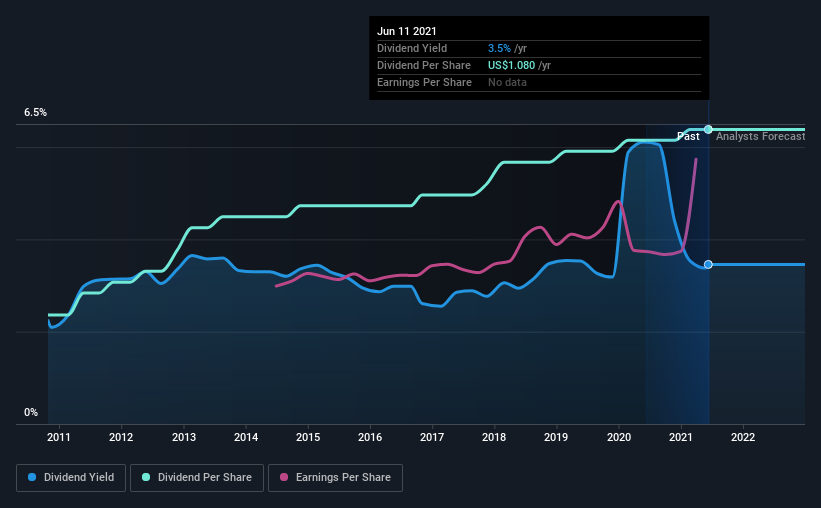Regular readers will know that we love our dividends at Simply Wall St, which is why it's exciting to see Financial Institutions, Inc. (NASDAQ:FISI) is about to trade ex-dividend in the next 4 days. The ex-dividend date occurs one day before the record date which is the day on which shareholders need to be on the company's books in order to receive a dividend. The ex-dividend date is important as the process of settlement involves two full business days. So if you miss that date, you would not show up on the company's books on the record date. Therefore, if you purchase Financial Institutions' shares on or after the 17th of June, you won't be eligible to receive the dividend, when it is paid on the 2nd of July.
The company's next dividend payment will be US$0.27 per share, and in the last 12 months, the company paid a total of US$1.08 per share. Calculating the last year's worth of payments shows that Financial Institutions has a trailing yield of 3.5% on the current share price of $31.24. We love seeing companies pay a dividend, but it's also important to be sure that laying the golden eggs isn't going to kill our golden goose! As a result, readers should always check whether Financial Institutions has been able to grow its dividends, or if the dividend might be cut.
Dividends are typically paid out of company income, so if a company pays out more than it earned, its dividend is usually at a higher risk of being cut. Financial Institutions paid out a comfortable 30% of its profit last year.
Generally speaking, the lower a company's payout ratios, the more resilient its dividend usually is.
Click here to see the company's payout ratio, plus analyst estimates of its future dividends.

Have Earnings And Dividends Been Growing?
Businesses with strong growth prospects usually make the best dividend payers, because it's easier to grow dividends when earnings per share are improving. If earnings decline and the company is forced to cut its dividend, investors could watch the value of their investment go up in smoke. For this reason, we're glad to see Financial Institutions's earnings per share have risen 13% per annum over the last five years.
Many investors will assess a company's dividend performance by evaluating how much the dividend payments have changed over time. Financial Institutions has delivered an average of 10% per year annual increase in its dividend, based on the past 10 years of dividend payments. It's exciting to see that both earnings and dividends per share have grown rapidly over the past few years.
To Sum It Up
Should investors buy Financial Institutions for the upcoming dividend? Companies like Financial Institutions that are growing rapidly and paying out a low fraction of earnings, are usually reinvesting heavily in their business. This is one of the most attractive investment combinations under this analysis, as it can create substantial value for investors over the long run. Financial Institutions ticks a lot of boxes for us from a dividend perspective, and we think these characteristics should mark the company as deserving of further attention.
While it's tempting to invest in Financial Institutions for the dividends alone, you should always be mindful of the risks involved. For example - Financial Institutions has 1 warning sign we think you should be aware of.
A common investment mistake is buying the first interesting stock you see. Here you can find a list of promising dividend stocks with a greater than 2% yield and an upcoming dividend.
This article by Simply Wall St is general in nature. It does not constitute a recommendation to buy or sell any stock, and does not take account of your objectives, or your financial situation. We aim to bring you long-term focused analysis driven by fundamental data. Note that our analysis may not factor in the latest price-sensitive company announcements or qualitative material. Simply Wall St has no position in any stocks mentioned.
Have feedback on this article? Concerned about the content? Get in touch with us directly. Alternatively, email editorial-team (at) simplywallst.com.
The views and opinions expressed herein are the views and opinions of the author and do not necessarily reflect those of Nasdaq, Inc.


